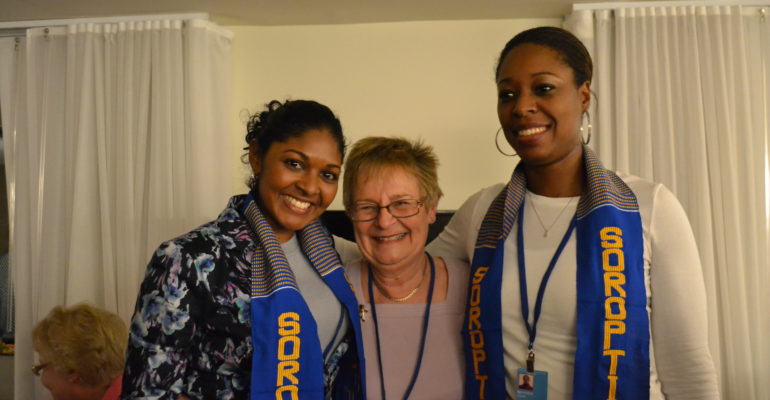Soroptimist International is a grassroots organisation that speaks on behalf of 80,000 women from 3,000 communities, across 130 countries and territories worldwide. Since 1921, Soroptimists have united around the principles of educating, empowering and enabling women and girls locally, nationally and internationally. All of Soroptimist International’s positions are based on their voices, perspectives and opinions.
Achieving gender equality is a cross-cutting issue that requires the commitment of Governments. Soroptimists call for a global increase in political will so as to confront gender inequality. Progress has been made, but the underlying structural barriers which make gender equality aspirational, rather than a reality, not only remain but in some cases have grown.
Since the creation of the Beijing Platform for Action Soroptimists have played a role in its implementation and 15 years ago a global survey of women was conducted by Soroptimist International. That survey found that violence committed against women and girls, women as leaders and decision makers, and access to education for women and girls ranked as the most important issues experienced by Soroptimists and the communities they work with. It is extremely disappointing that the areas of concern, identified barriers, and comments made over the last 20 years by Soroptimists are still relevant today.
Soroptimists are committed to implementing the Beijing Platform for Action, and are taking action on the identified key areas of violence committed against women and girls, women as leaders and decision makers, and access to education for women and girls. To change, we need the Soroptimist model: Educate, Empower, Enable. We must listen to women as first-hand witnesses to effect the change they need.
As a global voice for women, Soroptimist International brings grassroots perspectives to this Beijing+20 Review, and proposes that they must be addressed to ensure the achievement of equality:
Violence Committed Against Women and Girls
The lack of progress in this area since the adoption of the Beijing Platform for Action is unacceptable. Although changes to laws have been made, changes to society have not. Unfortunately, most approaches to reducing violence committed against women and girls have been top-down, not bottom-up. For solutions to be contextualised, culturally specific, and tailored to each community. The voices of women and girls, victims and survivors must be included in policy development and implementation. Furthermore, complementary progressive and safe indicators for measuring the elimination of violence against women and girls must be developed. By doing this, it is acknowledged that their experiences are nuanced and multifaceted; violence against women includes domestic violence, female genital mutilation, forced and early marriage, trafficking, sexual violence and femicide.
Women as Leaders and Decision Makers
Women are still underrepresented in positions of power and influence, at community, national and international levels. The participation of women and girls must be seen as a cross cutting issue and the voices of women and girls must be a part of policy setting at every level on all issues, not just those labelled as ‘women’s issues’. Including women as leaders and decision makers empowers them not only as individuals but as equal partners in a just, equitable and inclusive world. This is only possible if women are equally empowered as men in all areas of their lives.
Access to Education for Women and Girls
Gender stereotypes that are enforced by societies continue to create a world where women and girls are barred from achieving their fullest potential. Accessing available, quality, safe, affordable and lifelong education is crucial to the empowerment of women and girls as individuals and as members of their communities. Literacy, sexual and reproductive health education, vocational skills and other forms of education and training all contribute to equitable employment and are key to improving the lives of women and girls. A life-course approach to education must remain as a prominent issue in any new development agenda.
These core areas of concern for Soroptimists, women and girls are still as present today, as they were 20 years ago. They must not be present in 15 years’ time. The Beijing Platform for Action and the Post-2015 Development Agenda need to cohere in order to bring an end to gender inequality in all its forms.
This global review process provides an opportunity for civil society to remind member states that when they are negotiating the new development agenda, they are not just talking about language, they are talking about people. Gaps between ratification and implementation need to be closed. International agreement cannot only be in words – it must be enacted.
To support this, proper monitoring and accountability mechanisms must be introduced, and all collected data must be disaggregated by sex. This would ensure that progress and current challenges in achieving gender equality can be properly exposed and better solutions provided.
2015 has seen renewed focus on agreeing and achieving a development agenda that puts people at its centre. To do this, the voices of women and girls across the world must be listened to and their needs and opinions incorporated into that development agenda. Therefore, this Beijing +20 Review is a critical resource for member states as it provides a platform for women and girls. It is possible to overcome the structural and social barriers of gender inequality. At this conjuncture, the full implementation of the Beijing Platform for Action requires concrete action to make a difference to the lives of women and girls. Therefore, Soroptimists call on member governments to take action to educate, empower and enable women and girls. We must all continue to look at the world through women’s eyes.










Comments are closed.